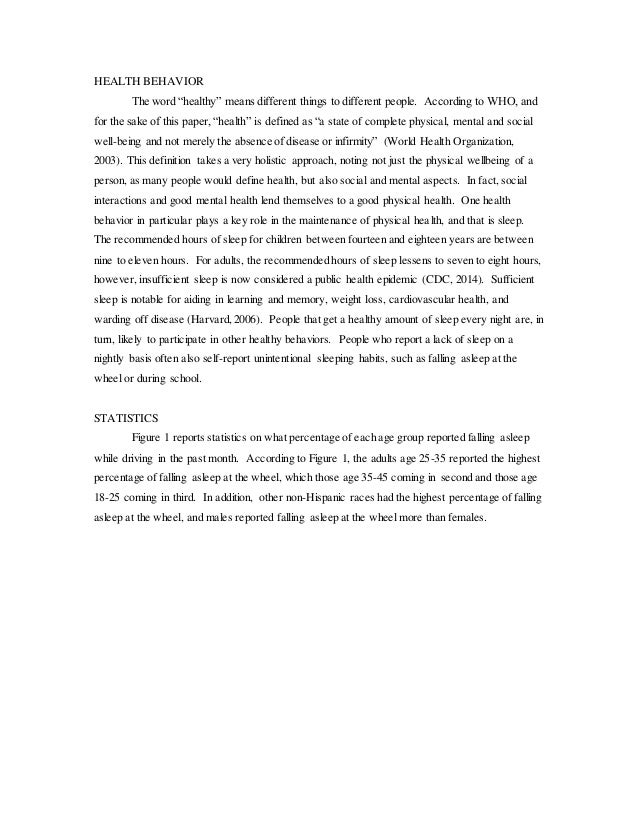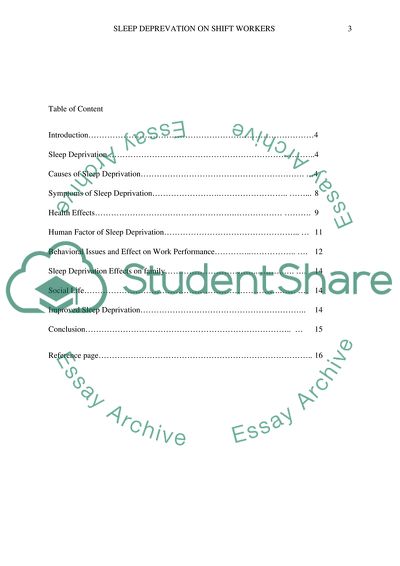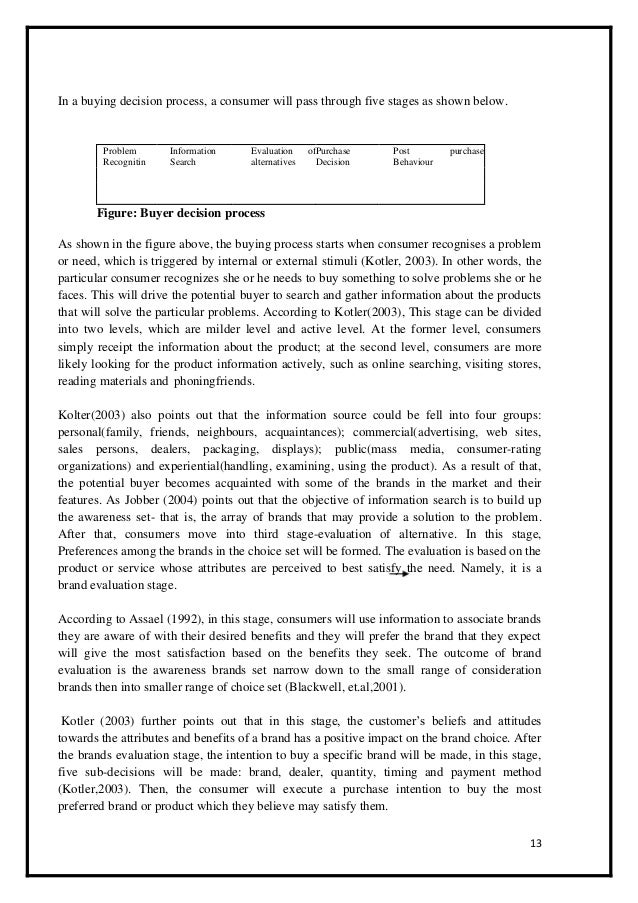
To explore the relationship between disturbed sleep and anxiety in more detail, the present study evaluated the effect of partial sleep deprivation (SD) on fear conditioning in healthy individuals. The neural correlates of 1) nonassociative learning and physiological processing and 2) associative learning (differential fear conditioning) were addressed The paper "Sleep Deprivation and Its Effects" discusses that normal sleep is vital for the body to rest and make any necessary repairs from illness, injury, and from the stress of daily life. Sleep is important for consolidating memories and in the regeneration and growth of the body Overview of Research Question. It is the desire of a majority of research in the field of sleep deprivation to determine what the optimum amount of sleep is for each person. This would be determined by the efficiency of a person’s memory, problem solving and critical thinking skills after a night of blogger.com Size: 1MB
Effects of sleep deprivation on cognitive and physical performance in university students
Try out PMC Labs and tell us what you think. Learn More. Sleep deprivation is common among university students, and has been associated with poor academic performance and physical dysfunction.
However, sleep deprivation research paper, current literature has a narrow focus in regard to domains tested, sleep deprivation research paper, this study aimed to investigate the effects of a night of sleep deprivation on cognitive and physical performance in students. Participants were randomized into two conditions: normal sleep or one night sleep deprivation.
The outcomes were cognitive: working memory Simon game© derivativeexecutive function Stroop test ; and physical: reaction time ruler drop testinglung function spirometryrate of perceived exertion, heart rate, sleep deprivation research paper, and blood pressure during submaximal cardiopulmonary exercise testing.
Data were analysed using paired two-tailed T tests and MANOVA. No significant differences were found in other variables. Reaction time and vascular response to exercise were significantly affected by sleep deprivation in university students, whilst other cognitive and cardiopulmonary measures showed no significant changes.
These findings indicate that acute sleep deprivation can have an impact on physical but not cognitive ability in young healthy university students. Further research is needed to identify mechanisms of change and the impact of longer term sleep deprivation in this population.
Sleep deprivation is common amongst university students whom live in a culture that promotes reduced sleep, due to the burden of academic work and social pursuits. The reasons for poor sleep hygiene include alcohol and caffeine intake, stimulants, and technology, which prevent students achieving sufficient sleep time and quality [ 1 ]. An average of 5. While many studies have investigated the effects of acute sleep deprivation, few focus on university students, despite the prevalence and impact of sleep deprivation in this population [ 45 ].
Such studies often have a narrow focus on disease states, limiting their ability to provide sleep deprivation research paper holistic assessment of physical, emotional and cognitive wellbeing [ 4 — 6 ].
Moreover, students rate sleep problems second only to stress in relation sleep deprivation research paper negative impact on academic performance [ 7 ]. The effect of acute sleep deprivation on physical performance has been well documented with negligible effects on intense periods of exercise, whilst endurance task performance suffers sleep deprivation research paper to decreased motivation [ 89 ].
The effect of sleep deprivation on cognitive performance has also been documented previously with a correlation between sleep quality and grade point average in first year university students [ 10 ]. Moreover, sleep deprivation has been shown to have a detrimental effect on certain aspects of working memory, sleep deprivation research paper, such as filtering efficiency, whilst Stroop test scores show degradation; however, this has been evidenced to be due to deficits in reaction time rather than processing skills [ 511 — 17 ].
Taken together, these data suggest that sleep deprivation sleep deprivation research paper have a limited effect on cognitive ability in university students. This was a randomized, controlled crossover study, which took place from June to September Exclusion criteria were: 1 any medication or medical history that would make participation in the study, in particular the sleep deprivation and exercise test, unsafe, or inappropriate; 2 mental incapacity to provide informed consent, or 3 recent within 6 months participation in a research trial, sleep deprivation research paper.
Participants were recruited via direct approach and posters on campus, social media, and a National Heart and Lung Institute newsletter. Participants travel expenses were reimbursed and all participants were offered the opportunity to be entered into a prize draw. Participants were told that the study involved testing parameters following sleep deprivation, but no information was given regarding the anticipated results.
Twenty-four hours prior to the morning assessment, participants were instructed to refrain from consuming alcohol and caffeinated drinks as well as abstaining sleep deprivation research paper exercise, smoking, and nicotine patches. The sleep deprivation arm were required to fill out a form every 45 min to confirm that they were still awake. This form was checked the following morning.
More than two unexplained missed form completions resulted in disqualification from the study. The crossover condition and assessment were undertaken within 3—12 days of one another. Testing occurred between towith participants being allowed flexible timings; however, sleep deprivation research paper, all follow-up testing aimed to take place within 1 h of initial session time.
The outcome was to measure the change, if any, which occurred between the cognitive and physical performance of participants undergoing sleep deprivation. Before testing began, height and weight were recorded and participants were asked to fill out a fitness questionnaire. The results of this questionnaire and participant sex were used to estimate the appropriate Monark Ergomedic e resistance for each participant, male: 2.
A second questionnaire enquired about recent within 24 h intake of food, caffeine, sleep deprivation research paper, alcohol, and nicotine, and any physical exercise was also completed. All participants were provided with standardized descriptions of tests and given the opportunity to habituate with procedures. The working memory mobile application was derived from the SIMON© game, an appropriate test for working memory span [ 18 ]. It involved repeating a random sequence of colors and sounds.
As each level progressed, another random color-sound combination was added to the previous sequence. This test was repeated three times. Standard stroop charts were used: 1 monochrome reading black text ; 2 conflicting color reading words with a mismatched color ; 3 color blocks articulating the color of colored blocksand 4 conflicting words articulating the color of mismatched words [ 19 ]. Four versions of each test were created, so that no participant used the same chart twice.
Time taken to complete each chart and the number of mistakes were recorded providing a measure of selective attention, automatic responses, inhibition, and control sleep deprivation research paper executive functions [ 20 — 22 ]. Participants performed two concordant volume-time spirometry traces, in adherence to standard guidelines [ 23 ].
Three electrocardiogram ECG electrodes were attached, and non-invasive blood pressure BP measurements and rating of perceived exertion RPE were also recorded throughout the exercise test Fig. Measurement of RPE has repeatedly been shown to have a strong correlation with the intensity of exercise being performed, independently from other factors [ 24 — 26 ].
Timeline showing the measurements taken during the CPET. After calibration, a one-minute baseline was conducted followed by 8 min of exercise and 3 min of rest. Non-invasive blood pressure BP measurements were taken using a manual sphygmomanometer at three points of the test: pre-exercise, post-exercise, sleep deprivation research paper, and post-rest period.
Rating of perceived exertion RPE 53 was recorded at the end of each minute. The ruler drop test was used to assess average reaction speed, a simple and inexpensive test compared to computerized assessments, with comparable reliability [ 27 — 30 ].
Participants carried out three practice runs to eliminate a learning effect [ 27 ]. Statistical tests were carried out using IBM SPSS Sleep deprivation research paper V Due to the novel measures used in this study, a preliminary study was performed to estimate appropriate sample size. Initially, descriptive statistics were obtained for all variables.
Data were inspected for normality using histograms. Differences in rating of perceived exertion and heart rate during exercise were assessed using multivariate analysis of variance test. The characteristics of the participants are summarised in Table 1 ; upon study entry, participants reported typically sleeping between 5 and 9 h per night, with Flow chart showing participant numbers during the study. Percentages indicate the percentage of individuals who remained from the previous stage.
Sleep-related characteristics were obtained using a questionnaire with a point scale, ranging from 0 lowest quality sleep, poor mood, and inadequate sleep to 10 best quality sleep, good mood, and fully adequate sleep.
Table 2 shows key variables from the exercise test. Data analysed using paired two-tailed T test. Error bars indicate two standard deviations. Average values for blood pressure as measured at rest, post-exercise, and post-recovery are also displayed. Table 3 compares the results of the cognitive tests and additional physical tests under sleep deprivation and normal sleep test conditions. The results of the first visit and second visit were compared irrespective of condition for the cognitive tests and reaction time.
Working memory and executive function both heavily rely sleep deprivation research paper the prefrontal cortex, anterior cingulate cortex, and salience network.
This network has been shown reduced activation post-acute sleep deprivation [ 31 — 35 ]. Interestingly, a comprehensive review has noted that particular tests show no significant difference, such as the digit span test. This test is most similar to the assessment of memory used in our study [ 3536 ]. Another study found that both partial and total sleep deprivation had no effect on visual working memory, but that total sleep deprivation had a significant effect on filtering efficiency [ 37 ].
As the Simon© game tests visual working memory, our results suggest that the effect of sleep deprivation may not be as widespread in university students, with components of memory being preserved [ 31 ]. The stroop test showed no significant increase in time taken to complete, or the number of mistakes made in each set. Acute sleep deprivation has been demonstrated to have no effect on the principal processes of interference or facilitation with performance influenced by increased reaction time [ 15 ].
Previously, the stroop test has been found to show practice effects [ 20 ]. This was evident in the present study with significant improvements made on the second visit, irrespective of participant condition. While it is difficult to interpret the reason for this result, it has previously been demonstrated that with increased age, there is an increase in brain activity in sleep deprivation research paper to acute sleep deprivation [ 38 ].
Therefore, the young student population may be more effective at dealing with acute sleep deprivation. Working memory and executive function are important with regard to university students, since they are linked to the understanding of complex concepts. Indeed, the previous research has shown a stronger correlation between attainment and working memory than with Intelligence Quotient [ 39 ].
This study found an increase in reaction time after sleep deprivation, which has previously been well described with student subjects [ 40 ]. The underlying physiology of this effect is localised to the anterior cingulate cortex, middle prefrontal gyrus, and inferior parietal lobes which have been shown to be hypoactivated in acute sleep deprivation. Of greater concern, the previous research has demonstrated that tired students are more likely to drive dangerously, another activity requiring prompt reactions.
Reaction time has also been linked with cognitive processing speed via mental chronometry, indicating that the effect of slowed reaction time may not be wholly in the realm of physical exertion, but also a pseudo measurement of Sleep deprivation research paper [ 44 ].
RPE is commonly described as involving aspects of both metabolism and CNS activity [ 4546 ]. There was no significant change in RPE in the present study, although mean RPE after sleep deprivation was higher than after a night of sleep. This contradicts much of the pre-existing literature, which suggests that sleep deprivation is associated with a significantly sleep deprivation research paper RPE but little or no change in physiological parameters [ 3547 ].
This study found a sleep deprivation research paper in HR post-exercise after acute sleep deprivation, although not significantly. A previous study has shown following two nights of sleep deprivation, sleep deprivation research paper, and HR was significantly lower, during, and after an exercise test, compared to two nights of sleep.
This was speculated to be due to ACTH concentration, which was lowest on the second day of sleep deprivation [ 48 ]. This is the same period over which exercise testing was carried out in our study, and could explain the effect on HR found. According to the present study, acute sleep deprivation had no effect on resting blood pressure, but caused an increase in systolic blood pressure post-exercise. Thus, the effect on blood pressure from this study was unclear, a finding which has been reflected in the literature [ 4950 ].
Sleep deprivation has previously been demonstrated to stimulate sympathetic activity and neuroendocrine response to stressor stimuli [ 47 ]. Therefore, continuous periods of sleep deprivation, e. Spirometry is commonly used in clinical practice for monitoring baseline lung function. Several limitations need to be considered when interpreting the findings of this study.
Sleep deprivation and memory problems - Robbert Havekes - TEDxDenHelder
, time: 12:50Sleep Deprivation and Its Effects Research Paper

Overview of Research Question. It is the desire of a majority of research in the field of sleep deprivation to determine what the optimum amount of sleep is for each person. This would be determined by the efficiency of a person’s memory, problem solving and critical thinking skills after a night of blogger.com Size: 1MB Long-term total sleep deprivation: no sleep for more than 48 hours Nocturnal awakenings: waking up during a period of sleep Limitations As with all correlational studies, the findings from the current study cannot reveal causal relationships between sleep deprivation and personal productivity. Another key limitation has been blogger.com by: 2 Nov 03, · The Research Paper. Sleep Deprivation. Effects of Sleep Deprivation. By Alexandra Goforth. In completion of the requirements of. English II Honors. November 3,

No comments:
Post a Comment